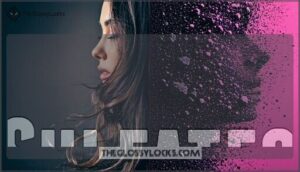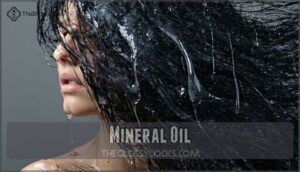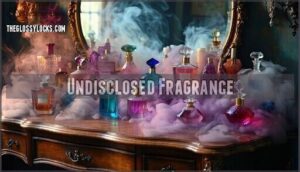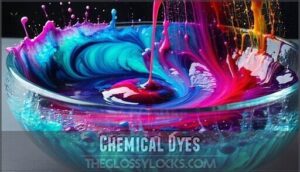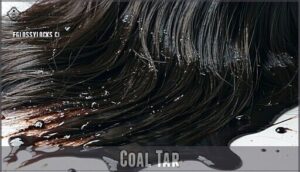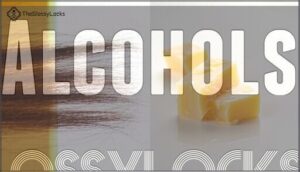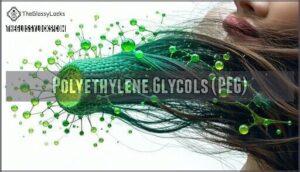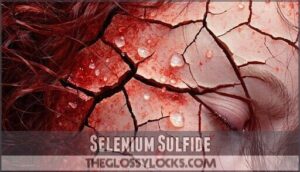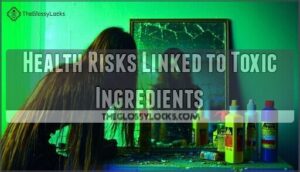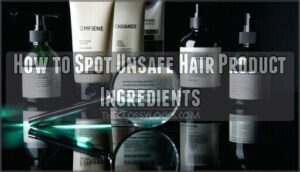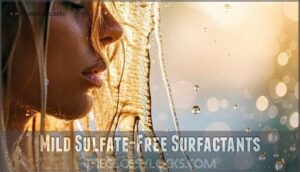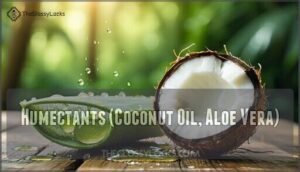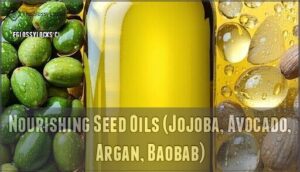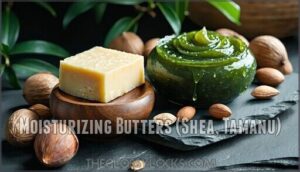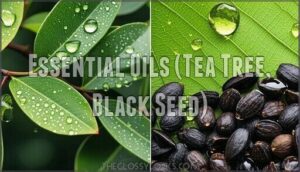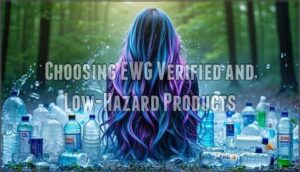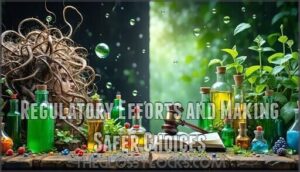This site is supported by our readers. We may earn a commission, at no cost to you, if you purchase through links.
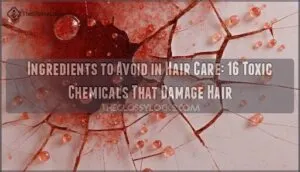
When you combine all this stuff, you’re looking at dry, irritated hair that gets worse over time.
Your scalp soaks up everything you put on it, so knowing what’s in your products really matters. And when you mix several of these chemicals together? The damage gets way worse.
Table Of Contents
- Key Takeaways
- Harmful Ingredients Commonly Found in Hair Care
- Health Risks Linked to Toxic Ingredients
- How to Spot Unsafe Hair Product Ingredients
- Safe and Natural Alternatives for Healthy Hair
- Regulatory Efforts and Making Safer Choices
- Frequently Asked Questions (FAQs)
- Are there any natural alternatives to conventional hair care products?
- How do I know if a hair care product is safe to use?
- Can damaged hair recover from toxic ingredients?
- How long until hair improves after switching?
- Are expensive products always safer than cheap ones?
- Do natural labels guarantee ingredient safety always?
- Can children use adult hair care products?
- Conclusion
Key Takeaways
- Check ingredients carefully – sulfates, parabens, phthalates, and undisclosed "fragrance" are red flags that strip your hair’s natural oils and disrupt hormones. Don’t trust marketing claims – "natural" or "organic" labels don’t guarantee safety, so use third-party tools like EWG’s database to verify what’s actually in your products. Watch for buildup ingredients – silicones and mineral oil create a fake smoothness but block moisture from reaching your hair shaft, leaving strands weighed down and damaged. * Switch to safer alternatives – look for sulfate-free surfactants, plant-based oils like jojoba and argan, and EWG-verified products that clean effectively without toxic chemicals.
Harmful Ingredients Commonly Found in Hair Care
Most shampoos and conditioners contain ingredients like sulfates and parabens that strip your hair’s natural oils and can irritate sensitive scalps.
Daily use of sulfates and parabens leads to scalp irritation, strips away moisture, and may pose health concerns over time.
Sulfates
Sulfates create that satisfying lather in your shampoo, but they’re stripping your hair of natural oils. Sodium Lauryl Sulfate tops the list of chemicals to avoid in hair products.
Here’s what sulfates do to your hair:
- Strip natural protective oils from your scalp and strands
- Cause sulfate sensitivity leading to irritation and dryness
- Create environmental impact through water contamination
- Trigger color fading in chemically treated hair
- Lead to overproduction of oils as your scalp compensates
Look for sulfate-free claims on labels, but check ingredients carefully. Many sulfate alternatives work just as well without the harsh stripping effects.
Parabens
Parabens are preservatives that keep your shampoo from going bad, but they’re not doing your body any favors. These chemicals can mess with your hormones and irritate your scalp.
Companies don’t always make it obvious either—they’ll list things like methylparaben or propylparaben on the label, banking on the fact that most people won’t recognize what they’re looking at.
Once you know what to watch for, though, you can easily find paraben-free options that are gentler on your hair and health.
| Common Parabens | Health Concerns |
|---|---|
| Methylparaben | Endocrine disruption |
| Propylparaben | Skin sensitization |
| Butylparaben | Hormone disruption |
| Ethylparaben | Allergic reactions |
Silicones
Silicones coat your hair strands, giving you that slick, smooth feeling that seems healthy but really isn’t. These synthetic ingredients build up over time, creating a barrier that stops moisture and nutrients from getting where they need to go.
Here’s how different silicones mess with your hair:
- Dimethicone weighs down fine or low-porosity hair with heavy buildup
- Cyclopentasiloxane might evaporate, but it still roughens up your cuticles first
- Amodimethicone actually seeks out damaged spots and makes breakage worse
There are better ingredients out there that actually help your hair without the environmental baggage that comes with silicones.
Mineral Oil
Mineral oil, derived from petroleum, creates a heavy coating on hair strands. This occlusive barrier blocks moisture from reaching the hair shaft, leading to dryness over time. You’ll notice your hair feels weighed down and lacks natural movement.
The bigger issue? Mineral oil comes from petroleum, which raises red flags for anyone thinking about environmental impact.
Better options? Try lightweight plant oils like argan or jojoba that actually feed your hair instead of coating it.
Undisclosed Fragrance
Fragrance loopholes let manufacturers hide toxic ingredients behind vague terms. You won’t find labeling transparency here—synthetic fragrances can contain dozens of harmful chemicals that trigger scent sensitivity and adverse effects.
- Fragrance mixtures may include 20-100 undisclosed chemicals
- Phthalate exposure occurs through scent-extending compounds
- Alternative scents from essential oils offer safer options
- Harmful ingredients in hair care hide behind "fragrance" labels
Phthalates
Phthalates lurk in Hair Care Products as hidden ingredients within fragrance formulations. These chemicals serve as solvents and preservatives but carry serious health risks.
Studies link phthalates to Hormone Disruption and Reproductive Effects, particularly affecting endocrine function.
Many countries have implemented Regulatory Bans on certain phthalates due to their Environmental Impact and potential for bioaccumulation in human tissue.
Chemical Dyes
Chemical dyes in hair products aren’t just about color – they’re derived from petrochemicals that can trigger dye allergies and skin irritation. These synthetic compounds cause adverse reactions in sensitive individuals.
Natural dyes offer color safety without harsh chemicals, though gray coverage may be limited. Consider PPD alternatives when choosing hair dyes to protect your scalp health.
Para-Phenylenediamine (PPD)
Para-phenylenediamine (PPD) in hair dyes triggers severe allergic reactions and skin irritation. This chemical causes dye sensitization, making future exposure increasingly dangerous. PPD allergies can develop suddenly, even after years of use.
Patch testing before applying any hair dye helps identify sensitivities. Look for PPD alternatives like henna or ammonia-free formulas.
Regulatory limits exist, but paraphenylenediamine PPD remains a top cause of adverse reactions in chemical dyes.
Coal Tar
While coal tar uses in hair dyes might seem harmless, this black substance poses serious health risks. Classified as a possible carcinogen, coal tar appears in some hair care products despite regulatory concerns.
You’ll find it listed on product labeling, but many brands now use alternative dyes. Check ingredient lists carefully since this toxic ingredient can accumulate with repeated exposure.
Alcohols
Alcohols in hair care products aren’t all bad, but many types strip your hair’s natural moisture. These drying alcohols damage hair cuticles and leave strands brittle.
- Harmful alcohol types: Isopropyl, ethanol, and denatured alcohol cause severe drying effects
- Safe fatty alcohols: Cetyl and stearyl alcohol actually moisturize hair
- Hair damage signs: Breakage, frizz, and scalp irritation from regular exposure
- Alcohol alternatives: Look for glycerin-based products that maintain hair health without harsh drying
Polyethylene Glycols (PEG)
Many hair products contain Polyethylene Glycols (PEG) as thickening agents. Here’s the problem: PEGs often come with nasty contaminants like ethylene oxide (a carcinogen that can mess with development) and 1,4-dioxane (another carcinogen that targets your liver and kidneys).
So when you’re washing your hair, you might be exposing yourself to some pretty concerning chemicals.
| PEG Functions | PEG Irritation | PEG Alternatives |
|---|---|---|
| Emulsifier | Scalp sensitivity | Plant-based emulsifiers |
| Thickening agent | Chemical penetration | Natural gums |
| Moisturizer | Contamination risk | Botanical extracts |
Triclosan
Triclosan remains an antimicrobial agent with serious health concerns despite partial regulatory restrictions. The FDA banned nineteen antimicrobial ingredients, including triclosan and triclocarban, in over-the-counter consumer antiseptic wash products due to insufficient safety evidence, but it still appears in some hair care products. Here’s what makes triclosan exposure concerning:
- Endocrine disruption – interferes with hormone function
- Antibiotic resistance – contributes to bacterial immunity
- Environmental impact – bioaccumulates in waterways
- Limited effectiveness – doesn’t prove better antimicrobial benefits
Retinyl Palmitate
Despite its beauty-enhancing reputation, retinyl palmitate brings serious photosensitivity concerns to your scalp. This vitamin A palmitate derivative may speed skin tumor development when exposed to sunlight and acts as a photosensitizer. Retinyl esters like retinyl palmitate aren’t safe in sun exposure.
Check product labeling carefully—harmful shampoo ingredients like this create adverse effects. The EWG recommends avoiding it in sun-exposed skin products. Proper dosage guidelines don’t exist for topical hair products, making toxic ingredients particularly risky for daily hair care product safety.
Benzene
Benzene contamination in hair care products poses serious health risks that you can’t ignore. This known carcinogen causes leukemia and blood cancers through skin absorption and inhalation.
Aerosol dry shampoos are the main culprits, with benzene entering through contaminated propellants used in spray products. Due to the potential presence of benzene, Unilever issued a recall of select dry shampoo products.
Regulatory limits exist because no safe exposure level has been established for this toxic ingredient.
Resorcinol
Resorcinol lurks in many hair dyes as a color developer, but this common ingredient is a skin irritant that’s toxic to the immune system and a frequent cause of hair dye allergy. Research reveals this chemical’s troubling side effects:
- Thyroid disruption: Disrupts endocrine system function and thyroid hormone synthesis
- Allergic reactions: Common trigger for hair dye sensitivity
- Respiratory issues: Can cause breathing problems at higher doses
- Skin irritation: Direct contact causes scalp and skin reactions
- Cumulative exposure: Repeated hair colorings create unknown long-term health risks
Professional stylists face the highest resorcinol exposure levels during daily work.
Selenium Sulfide
This antifungal ingredient appears in antidandruff treatments for scalp conditions like seborrheic dermatitis. While selenium sulfide offers effective dandruff treatment with proven antifungal properties, usage guidelines matter.
Potential side-effects include scalp irritation, hair discoloration, and skin sensitivity. These harmful ingredients can worsen existing scalp problems when overused, making selenium sulfide a double-edged sword in toxic ingredients lists.
Health Risks Linked to Toxic Ingredients
Hair products loaded with toxic chemicals put your scalp and body at risk from substances that can trigger serious health issues.
These harmful ingredients don’t just damage your hair – they can trigger allergic reactions, disrupt your hormones, and some are even linked to cancer risk.
Skin and Scalp Irritation
Your scalp can react badly to toxic hair care ingredients, showing clear warning signs. Sulfates strip natural oils, causing redness and flaking. Parabens trigger allergic contact dermatitis in people with sensitive scalp conditions. Alcohols create burning sensations during product testing.
Watch for these irritation symptoms:
- Red, itchy patches that worsen after washing
- Burning or stinging when applying products
- Excessive dryness or flaking around your hairline
Protecting scalp health means reading labels carefully and avoiding known irritants.
Hormone Disruption
Beyond irritation, your scalp absorbs hormone disruptors that mess with your body’s chemical balance. Phthalates and parabens act as endocrine disruptors, mimicking estrogen and altering hormone receptor activity.
These toxic exposures create biological impact far beyond your hair follicles. Propylparaben alone can interfere with reproductive health, while regular use compounds endocrine effects throughout your system.
Carcinogenic Potential
Cancer risk looms when you use products with specific hazardous substances. Formaldehyde is "carcinogenic to humans" and causes nasopharyngeal cancer and leukemia, while coal tar is a possible carcinogen that can contribute to cancer in the lungs, digestive tract, kidneys, and bladder.
These toxic exposure risks include:
- Chemical carcinogens like formaldehyde in hair straighteners
- Coal tar compounds in hair dyes
- Phthalates disrupting normal cell function
- Long-term health risks from regular use
Recent studies found formaldehyde and formaldehyde-releasing preservatives in shampoos and other personal care products.
Allergic Reactions
Allergic reactions from hair products can turn your daily routine into a nightmare. Fragrances and phthalates are common culprits behind skin irritation and itchy reactions.
Your sensitive scalp might develop redness, swelling, or painful bumps from these allergens. Hair allergies often stem from chemical preservatives and synthetic compounds that trigger your immune system.
Skin sensitivity varies between people, but allergic responses can worsen with repeated exposure to problematic ingredients.
Hair Dryness and Damage
Harsh chemicals strip your hair’s natural protective oils, leaving strands brittle and prone to breakage. Sulfates create that satisfying lather but damage your hair follicle over time. Formaldehyde treatments might smooth frizz temporarily, but they weaken hair structure. Mineral oil and silicones coat strands, preventing moisture from penetrating properly.
- Your once-shiny locks turning into straw-like strands that snap when you brush them
- Split ends creeping up your hair shaft like tiny lightning bolts
- A dry scalp that feels tight and uncomfortable, producing those embarrassing white flakes
Buildup and Weighed-Down Hair
While dryness weakens your hair, buildup creates another problem. Silicones and mineral oil coat hair strands, blocking moisture absorption and affecting hair porosity. Product accumulation weighs down your hair, making it flat and greasy. Dimethicone and polyethylene glycols (PEG) create invisible barriers that prevent scalp health.
| Ingredient | Buildup Effect | Hair Result |
|---|---|---|
| Dimethicone | Forms coating layer | Flat, lifeless hair |
| Mineral Oil | Blocks pore function | Greasy appearance |
| PEG Compounds | Creates residue film | Weighted-down strands |
Environmental Impact
Beyond personal harm, toxic hair care ingredients create lasting environmental damage. Sulfates and silicones wash down drains, contaminating waterways and harming aquatic life. Coal tar and phthalates persist in ecosystems, while triclosan disrupts marine organisms.
Your product choices matter—seek eco-friendly formulas with sustainable sourcing and green packaging to reduce your carbon footprint and toxic waste.
How to Spot Unsafe Hair Product Ingredients
Don’t trust the fancy labels and marketing promises on your shampoo bottles. Companies love to slap "natural" or "gentle" on products that still contain harsh chemicals.
Instead, flip that bottle over and scan the actual ingredient list. Look for third-party ratings like EWG scores to spot the stuff that can actually mess up your scalp and hair.
Understanding Ingredient Lists
Reading ingredient labels requires some detective work, but it’s your best defense against toxic exposure. Ingredients appear in order by concentration, so sulfates, parabens, and phthalates near the top signal higher levels.
Look for product certification marks and research unfamiliar chemical names. Safety standards vary, so polyethylene glycols (PEG) and other toxic ingredients in shampoo often hide behind scientific terminology.
Hidden Chemicals in “Fragrance”
That innocent-looking "fragrance" on your ingredient list hides a cocktail of up to 100 undisclosed chemicals. These chemical mixtures often contain phthalates, formaldehyde, and other toxic aroma compounds.
Synthetic fragrances bypass fragrance regulation requirements, creating scented product risks you can’t see coming. Added fragrances remain trade secrets, leaving you guessing about perfume ingredient disclosure.
Using Third-Party Verification (EWG, Skin Deep)
Third-party verification cuts through marketing noise to reveal what’s actually in your hair products. The EWG Skin Deep Database rates over 88,000 products using cosmetic safety ratings that expose parabens, phthalates, and other harmful chemicals lurking in your shampoo bottle.
- EWG Verification requires full ingredient disclosure and bans flagged chemicals
- Skin Deep Database scores products 1-10 for toxic ingredient screening
- Verified product labels indicate compliance with strict health criteria
- Database updates assist California’s Toxic-Free Cosmetics Act enforcement
Recognizing Marketing Claims Vs. Actual Safety
Don’t fall for flashy label claims like "natural" or "organic" without checking ingredients. Companies use greenwashing risks to hide parabens and phthalates behind vague terms. Check Safety Ratings through EWG Verified certification standards for real ingredient transparency.
| Label Claims | Reality Check | Action Step |
|---|---|---|
| "Natural" | No legal definition | Read ingredient list |
| "Sulfate-Free" | May contain other harsh chemicals | Verify all surfactants |
| "Dermatologist Tested" | Doesn’t mean safe or effective | Check EWG ratings |
| "Paraben-Free" | Often replaced with similar preservatives | Research alternatives used |
Safe and Natural Alternatives for Healthy Hair
Want healthier hair? Start swapping harsh chemicals for gentle, science-backed ingredients that actually nourish your hair and scalp instead of stripping them bare.
Natural alternatives like sulfate-free surfactants, plant-based oils, and EWG-verified products offer effective cleansing and conditioning while reducing your exposure to harmful chemicals.
Mild Sulfate-Free Surfactants
Looking for eco-friendly options that won’t strip your hair? Gentle cleansers with mild surfactants offer effective soap alternatives without harsh sodium laureth sulfate or ammonium lauryl sulfate.
These natural foams clean thoroughly while maintaining surfactant safety. Hair care products using coconut-derived cleansers create sudsy lathers without the damage traditional sulphates cause your scalp and strands.
Humectants (Coconut Oil, Aloe Vera)
Humectants act as moisture magnets for your hair. Natural emollients like coconut oil and aloe vera draw water from the air and lock it into your hair strands.
Unlike polyethylene glycols (PEG) found in many hair care products, these gentle conditioners provide enhanced hair hydration without toxic ingredients.
Coconut oil penetrates the hair shaft for deep moisture retention, while aloe vera offers skin soothing properties that calm irritated scalps. These natural ingredients promote overall hair health.
Nourishing Seed Oils (Jojoba, Avocado, Argan, Baobab)
Seed oils pack powerful nutrition for your hair and scalp. Jojoba oil mimics your scalp’s natural sebum, making it perfect for balancing oil production. Avocado oil penetrates deep into hair shafts with vitamins A, D, and E. Argan oil smooths frizz while protecting against heat damage. Baobab oil delivers omega fatty acids that strengthen hair follicles.
These natural moisturizers blend easily into hair care products without weighing down your strands.
Moisturizing Butters (Shea, Tamanu)
Rich natural moisturizers like shea butter provide deep hair nourishment without clogging pores. Its high concentration of vitamins and fatty acids and easy-to-spread consistency make it great for smoothing, soothing, and conditioning. Tamanu butter rejuvenates the hair, heals scar tissue, and protects your scalp from common conditions that cause hair loss:
- Butter benefits include reducing frizz for 12 hours
- Shea properties offer vitamins A, E, and F
- Tamanu effects heal scalp conditions naturally
- Hair care products absorb without greasy residue
- Natural ingredients prevent breakage and promote growth
Essential Oils (Tea Tree, Black Seed)
Tea Tree Oil and Black Seed Oil offer powerful natural remedies for scalp health. Tea Tree Oil‘s antimicrobial properties combat dandruff and fungal infections, while Black Seed Oil’s anti-inflammatory compounds soothe irritation.
These aromatherapy effects provide therapeutic benefits without harmful ingredients in hair care products. Both oils strengthen follicles naturally compared to synthetic alternatives.
Choosing EWG Verified and Low-Hazard Products
Shopping smart means looking for the EWG Verified mark on labels. This certification ensures products meet strict safety standards without toxic ingredients.
Use the Healthy Living App to check Skin Deep ratings—aim for scores of 1 or 2, indicating low hazard levels.
Look for paraben-free and other safe labels that align with California’s Toxic-Free Cosmetics Act standards.
Regulatory Efforts and Making Safer Choices
The feds are way behind on regulating toxic chemicals in hair products, but states like California aren’t waiting around—they’re starting to ban the worst offenders.
You can make informed choices by using third-party verification tools and understanding that multiple toxic ingredients create a "cocktail effect" that compounds health risks.
California’s Toxic-Free Cosmetics Act
California broke new ground in 2020 with its Toxic-Free Cosmetics Act, banning 24 harmful chemicals including carcinogens like coal tar and hormone disruptors such as triclosan. This California legislation targets ingredients linked to cancer and reproductive harm.
The regulatory updates took effect January 2025, with additional toxic chemical bans starting 2027. These cosmetic safety measures address environmental impact while protecting your health from dangerous substances.
The “Cocktail Effect” of Multiple Chemicals
Using multiple toxic ingredients in shampoo creates chemical interactions that heighten health risks. Cumulative exposure to endocrine disruptors and carcinogens leads to toxic synergies your body can’t handle alone. Regulatory gaps allow these dangerous combinations:
- Hormone disruption compounds when parabens meet phthalates
- Carcinogens interact with preservatives creating new toxic compounds
- Skin irritants combine to cause severe allergic reactions
- Chemical exposure builds up faster than your body eliminates toxins
- Toxic ingredients in shampoo work together magnifying individual effects
Tips for Informed Hair Product Shopping
Smart label reading means scanning ingredient lists for stuff like sulfates and parabens that can mess with your scalp. EWG’s database gives you safety ratings to compare products and research what’s actually in them.
Shopping guides help you spot the nasty ingredients companies try to hide in their fancy marketing. Do your homework with these tools before you buy.
Why settle for products that slowly damage your scalp when you don’t have to?
Frequently Asked Questions (FAQs)
Are there any natural alternatives to conventional hair care products?
Why settle for chemical cocktails when nature’s got your back? Coconut oil, aloe vera, and jojoba oil work wonders.
These natural alternatives moisturize without harsh sulfates or parabens that damage your scalp.
How do I know if a hair care product is safe to use?
Check ingredient lists for sulfates, parabens, and undisclosed fragrances. Look for EWG Verified marks or use the Healthy Living App to find products scoring 1-2 for low hazard ratings.
Can damaged hair recover from toxic ingredients?
Damaged, dry hair definitely bounces back from toxic ingredients. Your scalp stops producing excess oil, natural moisture returns, and hair texture improves within weeks of switching to safer products.
How long until hair improves after switching?
You’ll usually see improvements within 2-4 weeks after switching to cleaner products. Your scalp adjusts first, reducing irritation and buildup, while hair texture and shine gradually improve over the following month.
Are expensive products always safer than cheap ones?
Price doesn’t guarantee safety—70% of products contain harmful chemicals regardless of cost. Toxic sulfates and parabens are found in both expensive and drugstore brands.
Check ingredient lists, not price tags, for safer choices.
Do natural labels guarantee ingredient safety always?
Natural labels don’t guarantee safety. You’ll find harmful chemicals like parabens and sulfates in "natural" products. Always read ingredient lists carefully since marketing terms aren’t regulated.
Can children use adult hair care products?
Adult products pack stronger chemicals than children’s delicate scalps can handle. Those harsh sulfates and fragrances in grown-up shampoos can irritate their tender scalp tissue.
You’ll want gentler formulas designed for kids’ sensitive skin.
Conclusion
Congratulations, you’ve now mastered the art of turning your hair into a chemistry experiment gone wrong! Avoiding toxic ingredients in hair care isn’t just trendy—it’s necessary for your scalp’s health.
Don’t turn your hair care routine into a chemistry experiment—your scalp deserves better than toxic ingredients masquerading as beauty solutions
Your hair follicles don’t need petroleum residue, hormone disruptors, or mystery chemicals masquerading as "fragrance." Choose products with clean, recognizable ingredients instead.
Your scalp will thank you, and your hair will actually look healthy rather than temporarily glossy from synthetic coatings that cause long-term damage.
- https://www.livingproof.com/blogs/hair-101/are-sulfates-bad-for-hair
- https://www.healthline.com/health/sulfate-in-shampoo
- https://medihair.com/en/hair-care-industry-statistics/
- https://www.sciencedirect.com/science/article/pii/S0147651323011399
- https://cleanwater.org/2024/11/04/tea-toxic-beauty-disproportionate-impacts-toxic-chemicals-beauty-products-women-color

